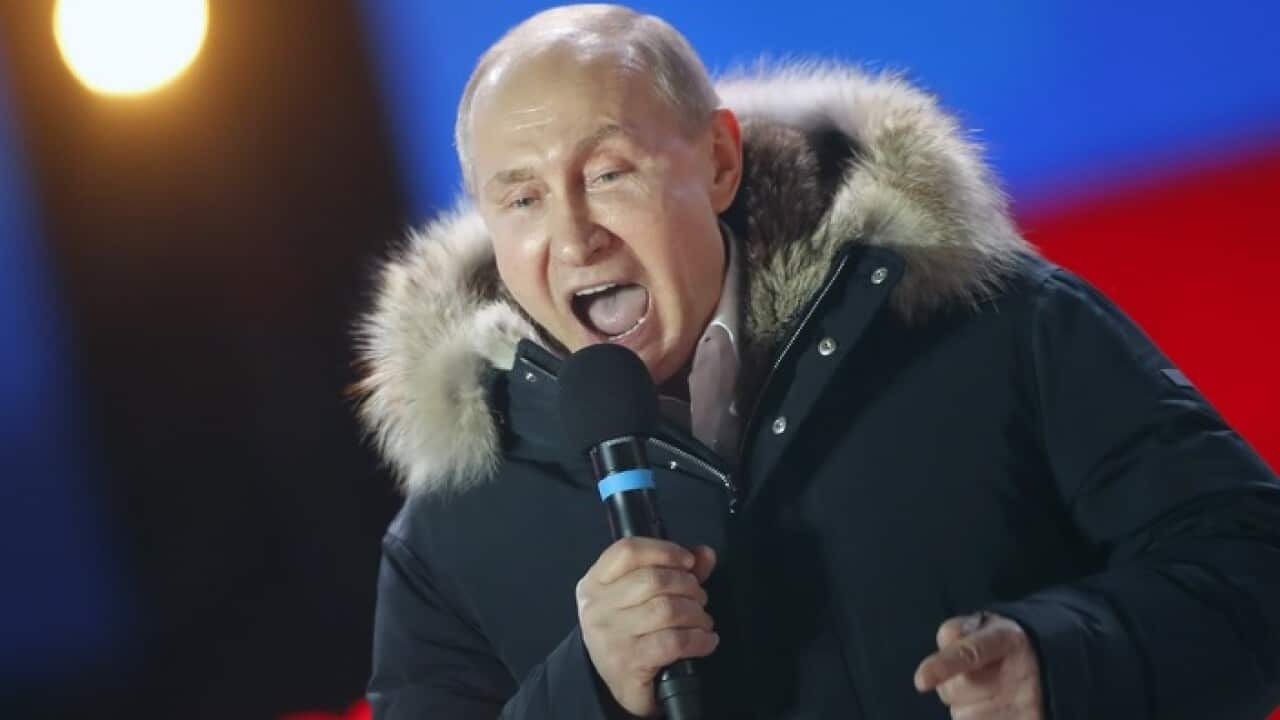Alexei Navalny was detained along with nearly 1,600 of his supporters on Saturday during nationwide rallies against Vladimir Putin as police and paramilitary activists used force to break up rallies in Moscow and Saint Petersburg.
Riot police beat protesters with truncheons, dragged them along the ground and threw them into police vans in Moscow, in an attempt to disperse a huge crowd that packed Pushkin Square to protest against Putin's swearing-in ceremony for a fourth Kremlin term on Monday.

Russian riot police arrest participants of an unauthorised liberal opposition rally, called by their leader Alexei Navalny. Source: AAP
Police grabbed Navalny, 41, soon after he showed up at the rally, as some shouted "Shame" in Ukrainian, a famous slogan of the Kiev uprising that ousted a Kremlin-backed regime in 2014.
Scuffles also broke out between Navalny's supporters and pro-Kremlin activists who showed up in an apparent effort to sabotage the opposition demonstration.
Some of the pro-Putin activists were dressed as Cossacks, a paramilitary class who served as tsarist cavalrymen in imperial Russia.
Amnesty International said its representatives saw the 'Cossacks' pummel protesters with whips and fists as police looked on.
Anti-Kremlin protesters chanted "the fourth term -- in prison" and "sick of you," in a reference to Putin, as a helicopter hovered overhead.
Two AFP journalists said some sort of gas was also briefly used but it was not immediately clear who used it.

Alexei Navalny speaks to supporters during an opposition rally before he was detained by police in Moscow. Source: AAP
Over 700 detained in Moscow
Navalny, who was barred from challenging Putin in the March presidential election, had called on Russians to stage a day of rallies across the country under the catchy slogan "Not our Tsar."
Protesters also rallied in dozens of other Russian cities including in the Far East and Siberia and some of those protests were violently broken up.
Independent monitoring group OVD-Info said nearly 1,600 people had been detained by police in 26 cities.
Of them, more than 700 were detained in Moscow and more than 230 in second city Saint Petersburg.

Russian police detain a protester at a demonstration against President Vladimir Putin in Pushkin Square, Moscow. Source: AAP
Police put the Moscow turnout at 1,500, adding that some 300 people were detained in the Russian capital.
Authorities said some 200 people were detained in Saint Petersburg.
In the former imperial capital, several thousand people marched along Nevsky Prospect, Saint Petersburg's main thoroughfare, chanting "Putin is a thief" and "Down with the tsar".
When police tried to stop the unsanctioned march, protesters pelted them with eggs and water bottles, an AFP reporter said.
'Putin not a tsar'
"The country needs changes," a 20-year-old protester, Stepan Duvanov, said in Saint Petersburg. "Putin is not a tsar to be sitting (at the Kremlin) forever."

Demonstrators carry posters depicting Russian President Vladimir Putin during a massive protest rally in St Petersburg, Russia. Source: AAP
Elsewhere, many protesters were also detained in a rough manner, observers said.
In the Urals city of Chelyabinsk more than 160 people were detained, while more than 60 were arrested in the eastern Siberian city of Krasnoyarsk, said OVD-Info.
Seventy five people were detained in the northern city of Yakutsk and more than 40 people were arrested in the southern city of Astrakhan, the monitor said.
"Craven old man Putin thinks he is a tsar," Navalny said on Twitter ahead of the demonstrations.
Observers have expressed fears that the protests could lead to mass arrests and criminal cases after similar rallies in 2012 led to a huge crackdown on the protest movement.
In May 2012, tens of thousands took to the streets to protest Putin's inauguration for a third Kremlin term, with rallies descending into clashes with police.

Demonstrators chanted "Putin's fourth term should be in prison". Source: AAP
Criminal charges were brought against around 30 demonstrators and many of them were sentenced to prison terms of between 2.5 years and 4.5 years.
The 65-year-old Putin, who has ruled Russia for almost two decades, was re-elected for a fourth Kremlin term in March.
He recorded his best ever election performance with more than 76 percent of the vote.
Independent monitors said the election was marred by a lack of genuine competition even though fewer irregularities were reported than in previous years.
'Journey of an invader'
This year Putin's minders are planning a fairly low-key inauguration ceremony that will not include a lavish Kremlin reception in an apparent effort to eschew any bad publicity, TV Rain, an independent channel, reported Friday, citing informed sources.
In 2012, Putin's black cortège raced through the deserted streets of Moscow on the way to his third Kremlin inauguration with authorities cordoning off roads, in what many saw as a major faux pas.
This time Putin will instead meet with volunteers who took part in his election campaign, the television channel said.
Speaking on radio, prominent political analyst Stanislav Belkovsky said that throwing a Kremlin banquet for the elites "when the number of poor people is sharply rising due to Western sanctions and counter-sanctions" is now seen as an unaffordable luxury.
Belkovsky said many people saw Putin's sweeping through deserted streets in the capital in 2012 as a "journey of an invader."


